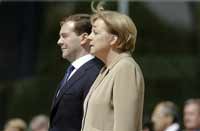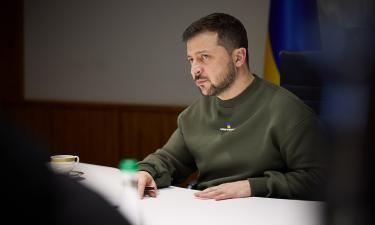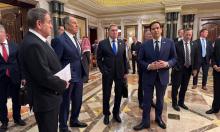Russia's Dmitry Medvedev arrives in Germany for talks on strategic partnership
Russian President Dmitry Medvedev arrived in Germany on Thursday, making his first Western trip since succeeding Vladimir Putin at a time when the European Union and Russia are preparing to start much-delayed talks on a new strategic partnership.

Chancellor Angela Merkel received Medvedev with military honors in a ceremony outside of the chancellory before heading to talks expected to focus on bilateral relations and international issues.
Medvedev is also to meet Foreign Minister Frank-Walter Steinmeier and President Horst Koehler during his eight-hour visit - only his second trip abroad since he was sworn in on May 7.
Merkel, who grew up in communist East Germany, speaks Russian. Still, ties have been more businesslike under Merkel than the friendly relationship that her predecessor, Gerhard Schroeder, enjoyed with Putin.
Merkel said before Medvedev's visit that it is necessary to expand and strengthen Germany's "close, friendly and strategic relations" with Russia - a major gas supplier to her country and the rest of Europe. She also offered praise for his intentions on the domestic front.
Medvedev "has indicated that he wants to develop and strengthen the constitutional state," she said in her weekly video podcast last Saturday. "I think this is a good signal."
Merkel said her discussions with Medvedev would range from the upcoming Group of Eight summit in Japan to the thorny issue of Kosovo, which declared independence from Russian ally Serbia in February.
Germany is among the many EU nations that have recognized Kosovo's independence; Russia fiercely opposes it, and has sided with Belgrade in opposing Kosovo's split from Serbia.
Thursday's talks also are expected to touch on future EU-Russia relations. EU nations last week finally cleared the way for negotiations on a far-reaching new pact with Russia on widening economic and political ties.
Efforts to start the talks had been held up first by a Polish-Russian dispute over meat exports and then by Lithuanian demands that Russia improve relations with neighbors such as Georgia and Moldova.
Merkel said it would be important to make clear "that the European Union acts together on energy security." Within the EU, a planned German-Russian gas pipeline under the Baltic Sea has caused tensions with Berlin's eastern neighbors.
Medvedev was Putin's hand-picked successor in the Kremlin, and few clear signs have emerged so far about who will lead Russian foreign policy. Traditionally Russia's president holds that responsibility, but many expect Putin to retain a substantial say in policy as prime minister.
Before the visit, Guido Westerwelle, head of Germany's opposition Free Democrats, said in Thursday's Frankfurter Rundschau newspaper that Medvedev had already "promised more openness, more liberalness and more democracy."
"It would be good if it is already clear during this visit to Germany that Russia, in the interests of our mutual relations, is already actually going in this direction," he was quoted as saying.
Germany's leaders already have been working to sound out the new president. Merkel met Medvedev in Moscow in early March, and Steinmeier met him on a trip to Russia last month.
Medvedev's one foreign trip as president so far was to China and Kazakhstan.
In Beijing, he and Chinese President Hu Jintao criticized U.S. missile defense plans that involve facilities in two eastern EU members, Poland and the Czech Republic.
Medvedev praised recent close ties between Russia and China as key to global stability and said the two wanted to strengthen their strategic partnership.
Subscribe to Pravda.Ru Telegram channel, Facebook, RSS!



